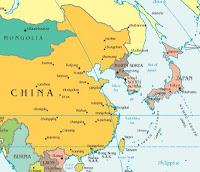Showing posts with label Economic Impact of China-Japan War. Show all posts
Showing posts with label Economic Impact of China-Japan War. Show all posts
Saturday, February 23, 2013
The Economic Impact of a War Between Japan & China
This article came from a very good article titled the same, The Economic Impact of a War Between Japan and China, from On Line MBA and in a very clear manner explains the issues and impact of a possible conflict between China and Japan. Saying that any shooting war between these two Pacific powers would adversely affect the economic status and well being of U.S. is an understatement.
Global economists are keeping their eyes glued to the Asia-Pacific region, where a bitter feud is brewing between two of the world’s most powerful nations over a small collectivity of islands in the East China Sea. The Chinese government argues that a treaty signed during the first Sino-Japanese War (1894-95) conferred ownership of the islands to China. Japan has long disputed these claims, and today argues that the islands are integral to its national identity.
The argument came to a head last September, when a boycott of Japanese products led Chinese demonstrators to target fellow citizens who owned Japanese cars. Three months later, the situation escalated when when Japanese jets confronted a Chinese plane flying over the islands; no shots were fired, but the act of antagonism has set a troubling precedent between the military forces of both nations.
The conflict between China and Japan has put the United States in a precarious position: if a full-scale war were to erupt, the U.S. would be forced to choose between a long-time ally (Japan) and its largest economic lender (China). Last year, China’s holdings in U.S. securities reached $1.73 trillion and goods exported from the U.S. to China exceeded $100 billion. The two countries also share strong economic ties due to the large number of American companies that outsource jobs to China.
However, the U.S. government may be legally obligated to defend Japan. In November, the U.S. Senate added an amendment to the National Defense Authorization Act that officially recognizes Japan’s claims to the disputed islands; the U.S. and Japan are also committed to a mutual defense treaty that requires either country to step in and defend the other when international disputes occur. Not honoring this treaty could very easily tarnish America’s diplomatic image.
The countries of the Asia-Pacific region are collectively responsible for 55 percent of the global GDP and 44 percent of the world’s trade. A major conflict between the region’s two largest economies would not only impose a harsh dilemma on U.S. diplomats, but also have a significant impact on the entire global economy. It is in every nation’s best interest that the Chinese and Japanese settle their territorial dispute peacefully.
You can also go to the On Line MBA article and read or download the transcript from the video below.
Subscribe to:
Comments (Atom)




